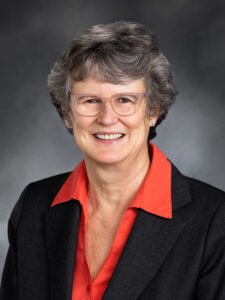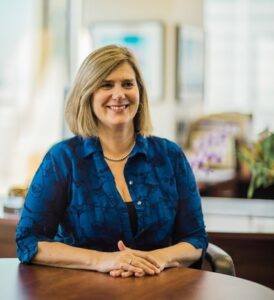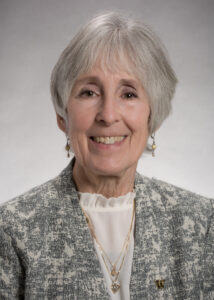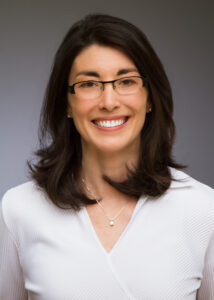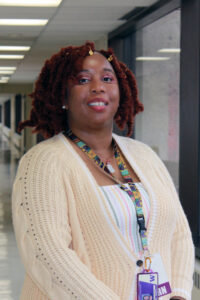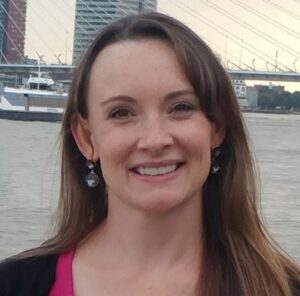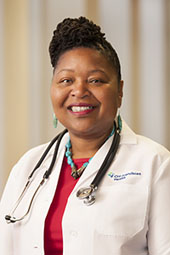2021 Nurses of Influence Awardees
2021 Nurses of Influence Awardees
We are proud to present the 2021 Nurses of Influence Awards to seven exceptional individuals, who have shown dedication, leadership, and commitment to advancing nursing both locally and globally. These awardees were nominated by their peers and selected by a panel of School of Nursing leadership, faculty, and advisory board members.
While we have honored awardees in the past with an in-person banquet, we have decided to continue the awards and sunset the event for the time-being. Learn more about the awards, and the upcoming 2022 cycle here.
Lifetime Achievement Award
The Lifetime Achievement Award is a prestigious award selected by the University of Washington School of Nursing’s Executive Dean. The recipient of this award demonstrates remarkable leadership and commitment to the nursing field and has proven their passion and devotion throughout their life and career.
Representative Eileen L. Cody, RN
Eileen L. Cody didn’t intend to be a nurse. But she became one. She also didn’t intend to be a long-time member of the state legislature. But she is. Nursing has benefitted from the paths she took at both forks in the road.
Cody holds a bachelor of science degree in nursing from Creighton University. “I started out as a pre-med when I entered college,” she says. “After my first year I got a job as a nursing assistant in a nursing home. I realized while working there that it’s RNs who get to spend time with patients, not MDs, so I changed into a nursing program after my sophomore year.”
Read more about Eileen L. Cody
The “accidental nurse” then became an “accidental president” of the Association of Rehabilitation Nurses, “because I didn’t show up to a meeting one month. I was young and stupid and didn’t realize when they asked me to do it that no one else wanted it.”
Cody went on to become active in forming a nurses’ union, and her visibility led to appointment and then repeated election to a seat in the state House of Representatives.
During her more than quarter-century tenure, Cody has been a knowledgeable and powerful advocate for affordable, accessible, equitable healthcare throughout the state. She currently serves as chair of the House Health Care & Wellness Committee, where she has focused on issues relating to patient safety, mental health care, and public health services. Rep. Cody will be retiring this year after her many years of service.
“Being a nurse, you have to lead,” says Cody. “We try to lead our patients to make better and healthier decisions in their care. We must negotiate with our patients to determine what they want from their care. We negotiate with other health care providers in how to deliver the care our patients request. Leading to me is a series of negotiations to move individuals in the direction you would like to see them go—all in the pursuit of a desired outcome.”
Distinguished Advocate, Administrator, Leader
This award recognizes an individual who demonstrates excellence in nursing advocacy, patient advocacy, administration and leadership; serves as a champion for the nursing profession, actively seeks to improve nursing management, administration and goes above and beyond across the nursing practice continuum. In 2021, our selection committee decided to celebrate two very deserving awardees.
Sue Birch, MBA, RN
The Distinguished Advocate, Administrator and Leader Award recognizes a person who “demonstrates excellence in nursing advocacy, patient advocacy, administration and leadership; serves as a champion for the nursing profession, actively seeks to improve nursing management, administration and goes above and beyond across the nursing practice continuum.” Sue Birch has, throughout her career, contributed in each of these ways.
As director of the Washington State Health Care Authority (HCA), the state’s largest health care purchaser, Birch has had a powerful and persistent influence on healthcare provisioning for the state’s most vulnerable residents. She was an early proponent of population health, recognizing and seeking to understand the role of the social determinants of health and thus addressing social and economic issues that would otherwise ultimately manifest as health issues.
Read more about Sue Birch
Birch has led efforts to combat the opioid public health crisis through increased access to treatment and public education, eliminate hepatitis C (HCV) through innovative value-based drug purchasing, and implement a Medicaid benefit for supportive housing and supported employment.
“Nursing is really the art of caring. To take that and blend it with an ability to align business principles to build toward a healthier society is really a great mix of skills,” says Birch.
“As a nurse, I loved helping heal one person at a time. As a nurse leader, I have the opportunity to improve the lives of hundreds of thousands of people at a time through policy development and using purchasing power. We need more nurses at the business table so we can have right balance of mission and margin.”
Sue Birch has been a leader in recognizing the symbiotic relationship of many diseases and their social correlates. Birch championed an innovative public-private partnership that brought the Washington State Health Care Authority (HCA), Washington State Department of Health, drug manufacturer AbbVie, and community leaders together to coordinate HCV elimination efforts. The partnership enables all involved stakeholders to work in sync to test more people for HCV, break down barriers to treatment and care, and expand access to affordable and effective antiviral medications.
“Nurses are an army,” says Birch, “and if we used the army of nurses differently, we could really mobilize in creative ways.”
Anne Hirsch, PhD, ARNP, FAANP, FAAN
In creating the “Distinguished Advocate, Administrator, Leader,” it was contemplated that the awardee would be just one of the three. Anne Hirsch (MN ’77) is a nurse of influence by virtue of being a distinguished advocate, an exceptional administrator, and a widely respected and deeply admired leader.
“The world needs us and we have the wherewithal to change the world!” says Anne Hirsch, and she has been actively doing that throughout a 40-year career that has seen her be a nurse of influence within the profession of nursing as well as the UW School of Nursing. This is reflected in the positions she has held, the honors she has received, and the respect she has garnered from colleagues.
Read more about Anne Hirsch
“Nursing has been a tremendous career for me,” Hirsch says, “with many opportunities for expanding my knowledge and skills, teach and mentor others and assume challenging and rewarding leadership positions.
“Although I began my career as a registered nurse in a small critical access hospital, I soon expanded my knowledge in a large metropolitan intensive care unit where I was inspired to learn more by going to graduate school. Working with students in the clinical setting as a preceptor, inspired me to become a nursing instructor. My role as a faculty member provided the best of both worlds—teaching eager students how to care for patients, while also providing patient care myself. And I was inspired to advance the science of nursing by developing my own scholarship. Finally, to continue to grow in my role as a clinician, I sought certification as an advanced registered nurse practitioner and now practice as an FNP as a volunteer with underserved and marginalized individuals and groups.”
Hirsch’s focus on marginalized people has also been reflected in her support of the School of Nursing’s antiracism and diversity, equity and inclusion initiatives including the country’s first Center for Antiracism in Nursing.
Hirsch has also been a major leader in implementing the UW School of Nursing’s partnership with Premera to support rural nurse training and recruitment, as well as evaluate outcomes associated with the initiative. In doing so, she has become a powerful advocate for equity of access to healthcare in the tribal, rural, and other underserved areas of Washington state.
Since coming to UW, Hirsch has been the associate dean of academic affairs as well as an active faculty member. In her role as associate dean, she has provided an always-steady hand on the helm, and served as both innovator and mediator. She will relinquish her associate dean duties in May 2022, affording her more time to make contributions to the rural nurse training program.
Through her other academic leadership roles, Anne Hirsch has helped establish a PhD program at Washington State University (WSU) and two doctor of nursing practice (DNP) programs, at WSU and Seattle University. She currently serves on the CCNE Accreditation Review Committee. Her leadership is thus present and having a substantial impact both within the School of Nursing and externally, throughout the profession.
“I am the consummate optimist,” says Hirsch, “and truly believe that we are embarking on a new, exciting era for nurses and nurse practitioners/midwives and for the health of our communities.”
Distinguished Researcher Award
This award recognizes an individual whose research, professional achievements and cumulative contributions have brought personal distinction, enhanced the profession, improved the welfare of the general public and brought honor and prestige to their field.
Mayumi Willgerodt, PhD, MPH/MS, RN, FAAN, FNASN
Dr. Mayumi Willgerodt is Associate Professor and Vice-Chair for Education in the Department of Child, Family, and Population Health Nursing at the University of Washington and affiliate faculty in the Center for Health Sciences Interprofessional Education Research and Practice (CHSIE).
Willgerodt sees nursing as both art and science. “The two in combination have the power to transform our individual health, families and communities,” she says. “In my current roles as researcher and educator, the science of nursing allows us to make sense of the data we have, while the art of nursing allows us to provide care that is evidence-based and grounded in data. I think these principles play out every day in the conduct of our research, teaching, coaching and mentoring.”
Read more about Mayumi Willgerodt
In 2018, Dr. Willgerodt and her colleagues published data from the National School Nurse Workforce Study. This was the first nationally representative study on the school nursing workforce. It illuminated the need for leveraging the professional expertise of school nurses to strengthen interprofessional care coordination and maximize efficiencies across systems of care. This study filled what had been a major gap in knowledge about the school nursing cohort.
Besides school health, Willgerodt’s other scholarly interests include interprofessional (IP) education and collaborative practice (CP) as a means to have an impact on health outcomes in youth, particularly in vulnerable and minority populations. Her research highlights the critical role school nurses play in helping to ease racial and income-based disparities common in other health care settings by providing basic care to students who might not otherwise receive it.
Willgerodt has led several teams on HRSA-funded grants to increase the nursing workforce with an emphasis on IPCP. She has developed, facilitated, and led IP curricula and training activities for students and faculty and provides consultation nationally and internationally on integrating IP curricula into both didactic and clinical settings.
She has been a nurse of influence and a distinguished researcher by fostering research and quality improvement efforts by school nurses as well as contributing through her own impressive body of original research and scholarship. The careers of many with whom Dr. Willgerodt has interacted were profoundly affected by her interest, collaboration, and mentoring. “I always tell my students to approach nursing from a stance of appreciative and humble inquiry, and assume positive intent. If you do that, everything else will follow,” she says.
“My family says that I never stop asking questions,” she continues, “which I tell them is simply a manifestation of my passion to understand, learn and make a difference, all of which is fulfilled through nursing.”
Dr. C. June Strickland Distinguished Diversity & Transcultural Nursing Advocate Award
This award honors a nurse who advocates for the needs of underrepresented populations and communities, encourages dialogue and reflection regarding societal power imbalances; and demonstrates leadership in promoting diversity in nursing. This award is named in honor of C. June Strickland, Ph.D., RN, Cherokee, from the family of Hawkins and her career-long work in prevention science and translation/transcultural research with American Indians in the Pacific Northwest. In her words, “We are part of the world and the world is part of us…global is local.”
Keondra Rustan PhD, RN, CHSE, CNE
Keondra Rustan is Assistant Director-Clinical Nurse Educator Simulation at the UW School of Nursing Simulation Center. “Nursing is a huge and humbling responsibility,” she says. “It takes a huge heart to be a nurse; I want people to appreciate nurses who are working in all settings, as many are working without adequate staffing.”
Rustan has brought a huge heart and a supportive attitude to her task of helping educate the next generation of clinical nurses. Through the simulations she oversees, nursing students of all levels have an opportunity to acquire and advance their skills in ways that would be difficult or impossible otherwise.
Read more about Keondra Rustan
Her role is that of mentor, and it’s one she cherishes. “I have a passion for mentorship. Being a mentor to others is a powerful method of leadership. In the clinical setting, I am a leader by supporting the education and care of others; I also advocate for my patients at the bedside and ensure they are getting the care they deserve and need (I consider equity, accessibility, etc.). I also ensure that my peers are getting the support that they need and will assist in leading crucial conversations and connecting healthcare professionals.”
The Strickland Distinguished Diversity & Transcultural Nursing Advocate Award honors someone whose field of vision includes the need to understand and address disparities in healthcare access, treatment, and outcomes based on race and culture. Rustan serves as a model for all nurses who believe antiracism, diversity, equity, and inclusion are basic tenets of our profession. She steadfastly works to improve the experience of all students by creating more just, equitable, and antiracist simulation experiences.
Dr. Rustan’s focus and sphere of influence does not end there. She serves the School of Nursing and the community through her involvement in countless projects, including the workgroup to compose the School of Nursing’s Pledge of Antiracism, the SoN Diversity, Equity, and Inclusion Committee, and spearheading the Board of Content Experts for the UW Continuing Nursing Education (CNE) Nurse Educators series focused on making meaningful change in the areas of antiracism, diversity, equity and inclusion in nursing education. She has also personally instituted a program with the Mary Mahoney Professional Nurses Organization and the UW School of Nursing to facilitate support and mentorship for students who identify as Black. She is a role model to many.
Rustan sees herself as “an advocate, care provider, and arranger in the clinical setting.” She is also a powerful advocate outside of the clinical setting, where she says she is “passionate about getting resources and care to the members of my community. I also, serve as a leader by providing information and training to others through presentations, workshops, and articles (soon to come).”
Distinguished Practitioner Award
This award honors a nurse who demonstrates excellence in nursing care, serves as an advocate for patients, families and/or communities, makes a recognizable difference through their practice and embodies the essence of the nursing profession.
Kristen Childress, DNP, ARNP, FNP-BC, AGNP-C, CWCN-AP
Some people grow into nursing as a career; others grow up knowing they will be nurses. For Kristen Childress (BSN ’01, MN ’03, DNP ’09), there was never any doubt. “I wanted to be a nurse from the time I was young. I just knew. My family would tell you that I was destined to be a nurse from the beginning. Even at the age of 5, I would step in to help my great-grandfather, who had dementia.
“I was fortunate to have early interactions with the nursing students and it was then that I heard about the role of the nurse practitioner. At around age 12 it became my goal to be a nurse practitioner some day! I’ve never looked back.”
Read more about Kristen Childress
Childress carried forward her early desire to help older individuals. She graduated from UW as an adult/older adult nurse practitioner. She subsequently returned and earned her doctorate, while expanding her scope of practice interest. Her areas of clinical and scholarly interest include issues related to aging with a focus on factors affecting the most vulnerable elderly and their access to care.
Dr. Childress has practiced as an advanced practice family nurse practitioner for nearly 20 years. Her scholarly interest includes issues related to aging, with a focus on factors affecting the most vulnerable elderly and their access to care, including dementia, homebound status, and a need for 24-hour care. Through her work in multiple settings and her focus on populations too often underserved, Kristen has been a nurse of influence, a leader, and a distinguished practitioner.
Her clinical practice requires extensive interactions with adult family home (AFH) providers in the community. Over time, collaborating with AFH providers, she has been instrumental in identifying ways of improving skill levels, filling knowledge gaps, and improving communications. She facilitated collaboration with the Adult Family Home Council of Washington State as a student, and worked with them to develop survey questions. She developed and presented content that was given as a live webinar, educating AFH providers on strategies to obtain the information or resources they need for their residents from primary care or during transitions of care from other settings.
Building on her collaboration with AFH providers and caregivers in the community, Dr. Childress is involved in the education of and clinical decision support for unlicensed caregivers. Caregivers have the most direct contact with patients and the most opportunity to identify problems early but have the least amount of education of any role in healthcare.
In summary, Dr. Childress is a scholar, clinician, and mentor who strives to advance nursing practice and serve as a role model for the next generation of nurses.
“Some of my leadership,” she says, “shows up in advocacy and giving a voice to those who are underrepresented or have challenges navigating the often-complex institutions of healthcare or academia to get what they need”. Childress is often the voice for those who can no longer express their thoughts.
“At my core I’m an advocate for those who struggle to make their voice heard. In the clinical environment, this means that I often take over the care for patients who do not have family members who are actively involved, or for patients who have state- appointed guardians. I frequently act as an interpreter of sorts for people living with dementia, explaining to caregivers and families why the difficult words or behaviors that suddenly show up aren’t representative of that person, but are often a cry for help when that person can no longer find the words to express themselves.”
Nursing is a profession of compassion, and Kristen Childress is a compassion advocate and a nurse of influence. Her efforts are helping change the context in which the care of people with dementia is understood.
Distinguished Alumni Award
This award recognizes a UW School of Nursing graduate whose career in nursing exemplifies excellence in clinical practice, leadership in professional organizations, outstanding accomplishments, and contributions to the community.
Joycelyn Thomas, DNP, FNP-BC
Joycelyn Thomas (BSN ‘ 96, MN ’13, DNP ‘ 14) didn’t set out to be a nurse, but she did set out to help people. “I wanted to help people and heal people,” she says. “That passion or drive never went away as I grew older. I had a menagerie of little wild and domestic animals and tended to each one like they were a child. That was my goal in life, to be in health care. I fashioned school and activities around this.”
Nurses exert influence in a variety of ways. One way Thomas accomplishes it is as a clinical preceptor, paying it forward to succeeding generations of nursing students. “My impact on my profession is and will be evidenced by those students that I precept,” says Thomas. “I am the type of person who wants to change the world. But I realized I had to learn to do it within my own constructs, within my own circle. So I focus on what I can do in my current environment.”
Read more about Joycelyn Thomas
But it doesn’t stop there. She also wields influence by her presence on a number of boards including the University of Washington Foundation Board, the Dean’s Advisory Board for the School of Nursing, and by helping facilitate listening sessions for the Center for Antiracism in Nursing.
Her final sphere of influence is within her community, and it is a large sphere. “I have the most passion for my community,” Thomas says. “The pandemic along with the social justice movement in the wake of the killing of George Floyd spurred me to action. I felt energy I have not felt in years to get something done. I invested my efforts in collaborating with others to administer vaccinations in BIPOC communities. I am very proud of this work. Particularly with Fred Hutch, African American Reach and Teach Health, Seattle Cancer Care Alliance, and my church New Beginnings Christian Fellowship. We delivered over 8,000 vaccinations at my church through this collaboration. It was amazing.”
That experience led to others led to others, explains Thomas, who subsequently worked with City of Seattle, the Center for Multicultural Health, Dunia Clinic, Southeast Seattle Senior Center, and the Mary Mahoney Professional Nurses Organization to provide inoculations in Southeast Seattle. “Each collaboration brought something new to the table—new experiences, new process protocols, new people. What was the same was people coming together for the common good. We were able to touch hearts, educate people, love on people, vaccinate people, and most important, in each of those collaborations the vaccinators looked like the people they were serving. It was a powerful statement and life giving. I will never forget it.”
Thomas’ goal is to lead by being an influencer rather than a formal “leader.” “I want to be an example, a resource, an inspiration. The same goes for my community. I feel that if I can be the best I can be at what I believe in, then others will mimic or follow. Sometimes leading binds your hands, ties you up, and the passion that you may have for something is clouded by bureaucracy.”
That’s how the little girl who always wanted to help people became a nurse of influence.
